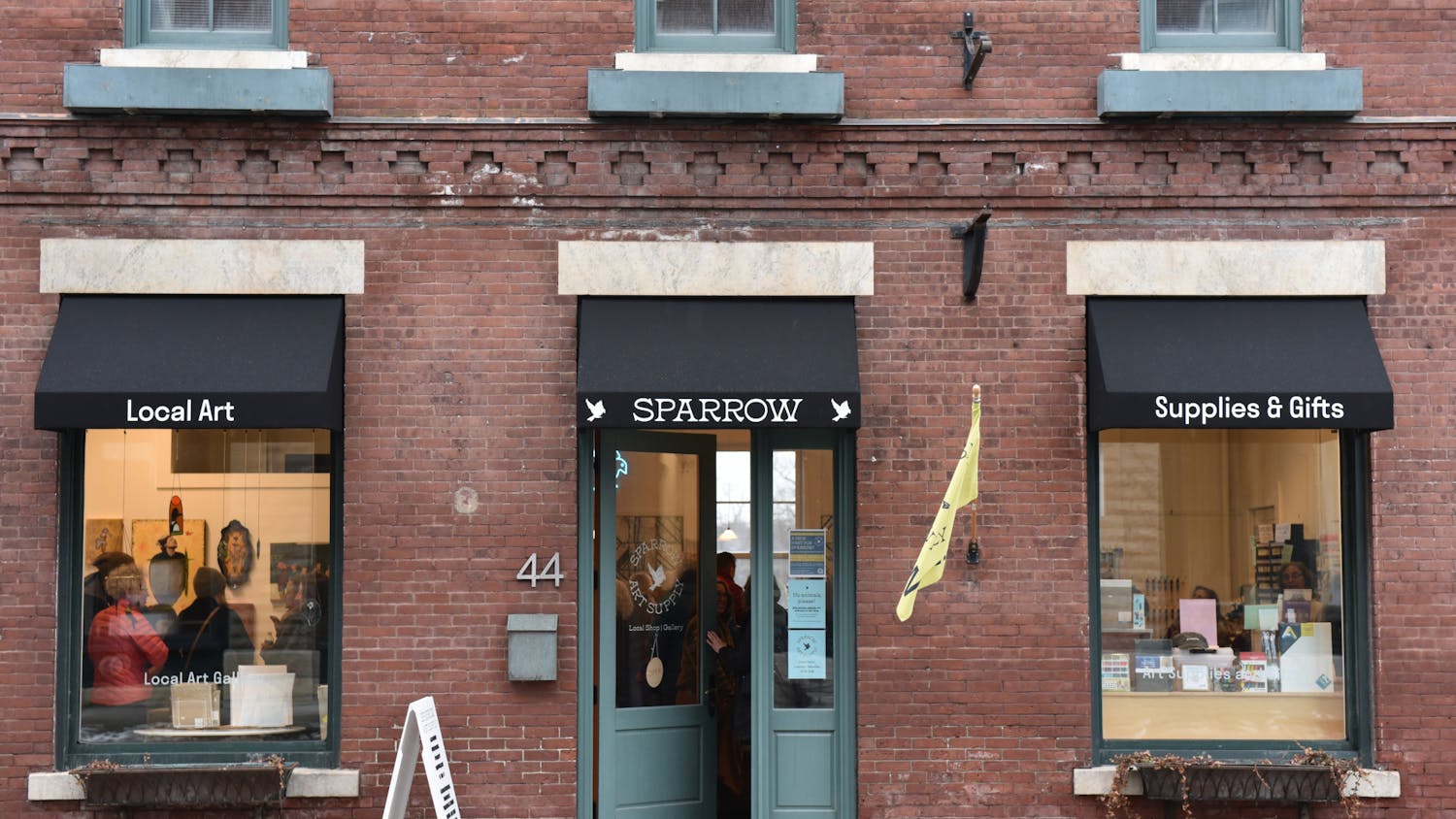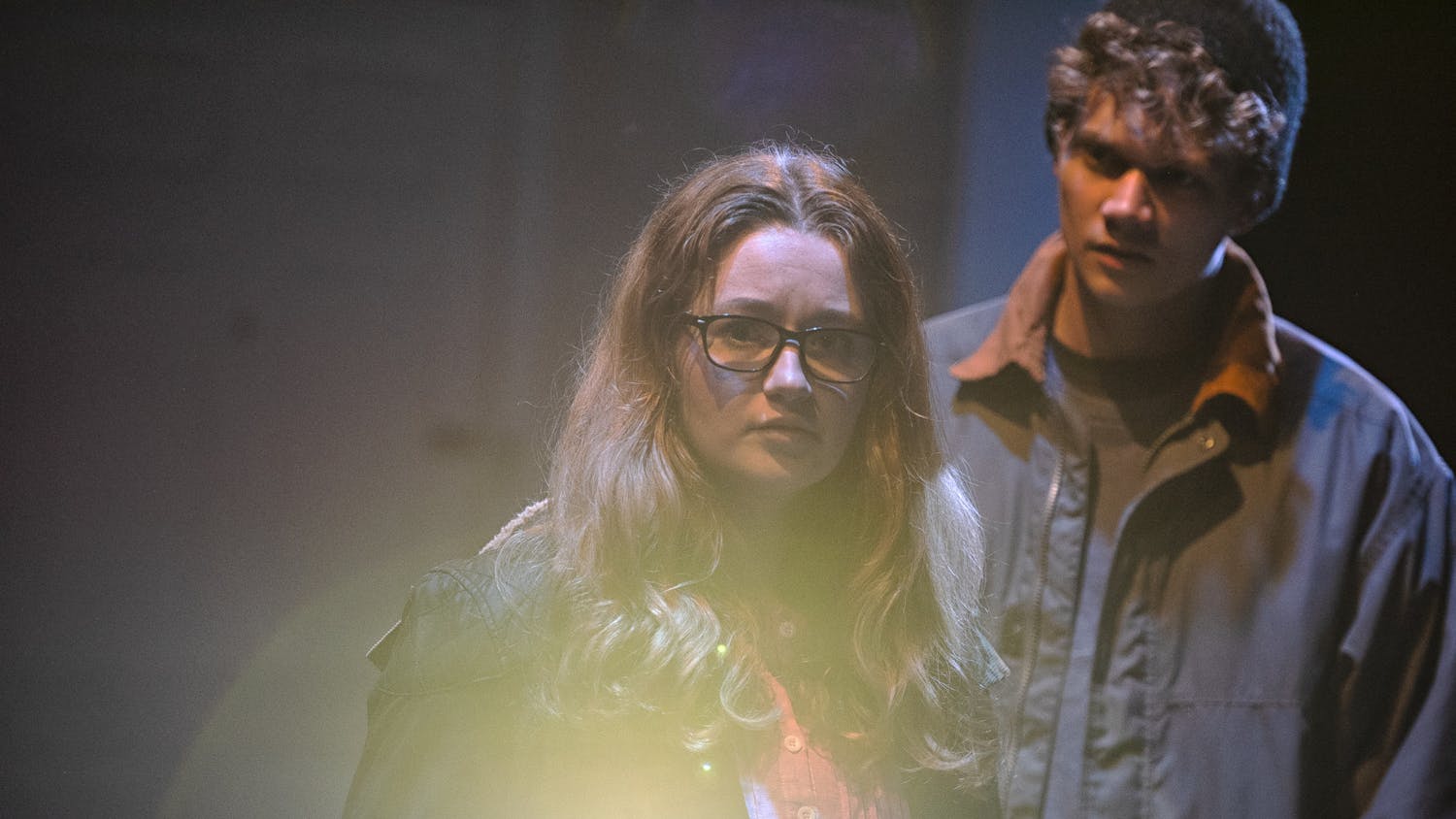Hepburn Zoo has always been known as a venue for unconventional art performances, but last weekend’s performance may have topped them all: On Friday, March 3 and Saturday, March 4, the doors opened, free of charge, for Middlebury Discount Comedy’s second ever show, Much Love in this Air.
Founded last fall by Shannon Gibbs ’18, the campus’s first sketch comedy group is comprised of 11 students: President Gibbs, Vice President Isabella Alonzo ’18, Producer Liana Barron ’18, Head Writer Greg Swartz ’17.5, Head Director Alexander Herdmann ’17, Faraz Ahmad ’19, Dan Fulham ’18, Sebastian LaPointe ’18, Peter Lindholm ’17.5, Jack Ralph ’18 and Marney Kline ’17.5. Coming from a wide range of experience levels and majors – from computer science to theatre to English, with no discipline in the clear majority – the company produces all of its sketches through a collaborative round-table format.
Posters for the show featured all members of the company lying in a sea of roses, completely nude save for a few petals photoshopped strategically over their private parts. According to Gibbs, the provocative, creepy and vaguely romantic vibe behind these promotional pieces was completely intentional and particularly accentuated by the fact that Much Love in this Air premiered nearly three weeks after Valentine’s Day. ‘Who says the season of love is over?’ the posters seemed to ask, foreshadowing the unconventional sense of humor that lay behind the entirely student-run production.
Gibbs opened the show with a list of trigger warnings for sexually explicit material, violence, abortion and other inflammatory topics. In the 24 sketches that followed, ranging in length from a mere 30 seconds to several minutes, these themes were escalated, decontextualized, satirized, broken apart, muddled up and in some instances, oddly mishandled. Puzzling at some moments and shocking at others, Much Love in this Air proved to be far more unsettling a performance than even its posters could suggest.
Sexual content was pervasive throughout the show, beginning with a three-part series of sketches in which a male student, played by Swartz, is taken hostage and forced into a sexual bondage by a female Public Safety officer, played by Alonzo. Another student, played by Barron, watches on in helpless horror. The premise for this story is understandable enough: two students are caught drinking underage, and the officer must confiscate their alcohol. However, the situation quickly escalates into a bizarre commentary on the tense relationship between Public Safety and the general student body. As Barron appeals to the administrator to release her boyfriend, she ends up screaming hysterically into the phone, “Right, you’re trained, but who the fuck are you helping?” followed by, “Why do I voluntarily go into this bureaucratic shit hole?” She is eventually transferred to the Department of Existential Crises, where a soothing voice on the other end, performed by Ahmad, instructs her to “imagine yourself running through a field of puppies with a middle-aged, robust Public Safety Officer” and to “gently breathe in and lock your fingers underneath your cheeks.”
“Now, if you have a tight little asshole, press two and you will be transferred back to Public Safety,” Ahmad says in the final line of the sketch, leaving the audience to pause and then giggle in bewilderment.
Such was the nature of most of the night’s performances: Shameless in their absurdity, the sketches were often cloaked in dark humor and met with relative silence, as the viewers struggled to process what they had witnessed onstage. For the most part, MDC’s outlandish approach to comedy seemed incongruent with the audience’s taste – but this did not seem to faze the actors, whose emphatic voices and humorously exaggerated facial expressions remained as strong as ever from beginning to end.
Another sexually explicit scene, innocently titled “Science Class,” featured a teacher offering his students a “more hands-on experiences” through a new form of “dirty work.” This euphemistic language quickly gives way to the crude question, “How many of you have been f**ked in the ass before?” The class proceeds to split into pairs to carry out this activity, with one student’s clear discomfort becoming the focal point of the lesson. Perhaps surprisingly, the blatant ridiculousness and obscenity of the sketch drew considerable laughter from the crowd, though many audience members were undoubtedly left asking themselves what exactly they were laughing at – and what message the outrageous script was trying to convey.
The line between outlandish humor and incomprehensible absurdity was crossed at a few points throughout the night. For several uncomfortable minutes, the audience watched as Winston and Lydia, a dysfunctional young couple as portrayed by Gibbs and Fulham, broke out into a fight at a night club, dancing feverishly together the entire time. The juxtaposition between their volatile words and cheery, perfectly synchronized choreography was clever, though their enunciation was often obscured by their quick movements, making it difficult to follow the conversation. The parts that were audible, however, were often too over-the-top and intentionally lewd for the audience to feel comfortable laughing.
“You mean you’ve been using condoms this whole f**king time?” Lydia shrieks at one point.
“Maybe if you weren’t such a f**king slut c**t we would think twice about it, Lydia,” Winston responds.
The tendency to veer too far into unsettling extremes escalated into outright violence during “Faraz’s Final Rose,” a scene based on the wildly popular reality show The Bachelor, as well as during a couple of abortion sketches. Firstly, the final rose ceremony – in which the bachelor selects one of three beautiful girls to be his wife – concludes with Chris Harrison, the host of The Bachelor as portrayed by Lindholm, chasing down and shooting the first runner-up, played by Gibbs. “I’m still alive, asshole,” are her final words in this unnecessarily grotesque scene. What had begun as an entertaining commentary on the problematic premise of The Bachelor devolved into an unwarranted display of violence.
Next, in what was likely the most disconcerting performance of the night, a pharmaceutical clinic offers a list of painful options to women seeking an abortion, including but not limited to hypothermia, being thrown down a flight of stairs and a series of punches to the gut, courtesy of a creepy man named Lucifer. In this jarring satire of the current health care system, lines like “I think sluts like you deserve a 50-50 shot” and “My father took me hostage so I wouldn’t murder the child we made” are delivered with a sort of bluntness, a blatant desire to provoke, that comes across as inappropriate. When the first woman to request an abortion emerged blood-stained from behind the curtain, followed by a stab to the torso that took the life of the second patient, the disapproving silence from the crowd seemed to be directed not at the real-life issues that inspired the sketch, but rather at the wildly disturbing content of the sketch itself.
Recognizing that their self-identified “Freudian” style can be more than a little odd, Middlebury Discount Comedy (MDC) writes all of their sketches with the hopes of highlighting the severity of real-world problems.
“We take an issue that’s pertinent to us as Middlebury students or as citizens of the world and we blow it up to an extent that it’s so decontextualized that people can see the satire we’re trying to go for,” Barron explained. “We’ll heighten it and heighten it and heighten it until finally, it’s violence.”
“This show tackles issue that are a bit more sensitive and takes them to a darker place,” Swartz added.
Not all moments in Much Love in this Air were completely off the mark, however. A 30-second public service announcement, delivered by Fulham, brought the crowd to a roaring laughter with its sheer, deadpan simplicity: “Now, remember, kids,” he said. “Drugs. One day, you just start doin’ em.” In contrast, a cult-like sing-along of the phrase “Prepare the way of the Lord” in “Trump’s Inauguration” introduced an eerie sense of hysteria to the room. This creepy take on the political storm that has ravaged the United States was met with a positive reception, as disgust toward the Trump campaign is a common sentiment amongst the overwhelming majority of Middlebury College students.
Meanwhile, in terms of prevalent on-campus issues, a sketch entitled “Atwater Speed Dating” resonated with many. In this well-executed performance, a female student meets one unappealing candidate after another – from the insensitive and dull to a guy who refers to himself exclusively as “Jaboi” – during a night out. Taking place amidst blaring music in a shadowy suite, it is an apt interpretation of a social scene that many students have described as stifling, unsatisfactory and frustratingly cyclical.
“People like it when you talk about things that are relevant and happening right here, in here, in this bubble,” Barron explained. “We have a tone to us that’s very idiosyncratic and dark.”
Following a whirlwind perusal of relevant issues both on campus and in the real world, a stand-out sketch of the night centered on the group’s round-table sessions. All 11 members of the company gathered onstage to parody the process of pitching ideas and writing scripts, with one major plot twist: the actors were all topless (save for 3-D heart attachments covering the girls’ nipples). As the scene progressed, the inexplicable half-nudity began to make more sense. Gibbs proposes that they all be topless together for their next show, to which Alonzo responds, “I don’t think that’s really tasteful, Shannon; not all of us are comfortable with our bodies like that.” A heated debate ensues – “What’s the joke?” “What’s the context?” – and as the audience stared at the bare-chested group of people before them, the irony became suddenly clear. Infused with a strong dose of Freudianism, the scene ends on an abrupt and meta note.
Comedy has long served as a vehicle for powerful social commentary, bringing humankind’s ills under the most revealing of lights and inviting all to observe. However, the humor behind Much Love in this Air hinged largely on a brash insensitivity that alienated audience members more than it challenged them to explore the difficult issues at hand. Though there were certainly moments of clever satire sprinkled throughout the night, if the uncomfortable silences were any indication, the show was deeply perplexing and perhaps too heavy to bear at times. Whether in moments of laughter or quiet unease, MDC pushed the audience to consider why they were or were not laughing, as their shotgun-firing, belly-bleeding sketches blurred the line between what is appropriate to convey and what is not.
Middlebury Discount Comedy Provokes
Comments



